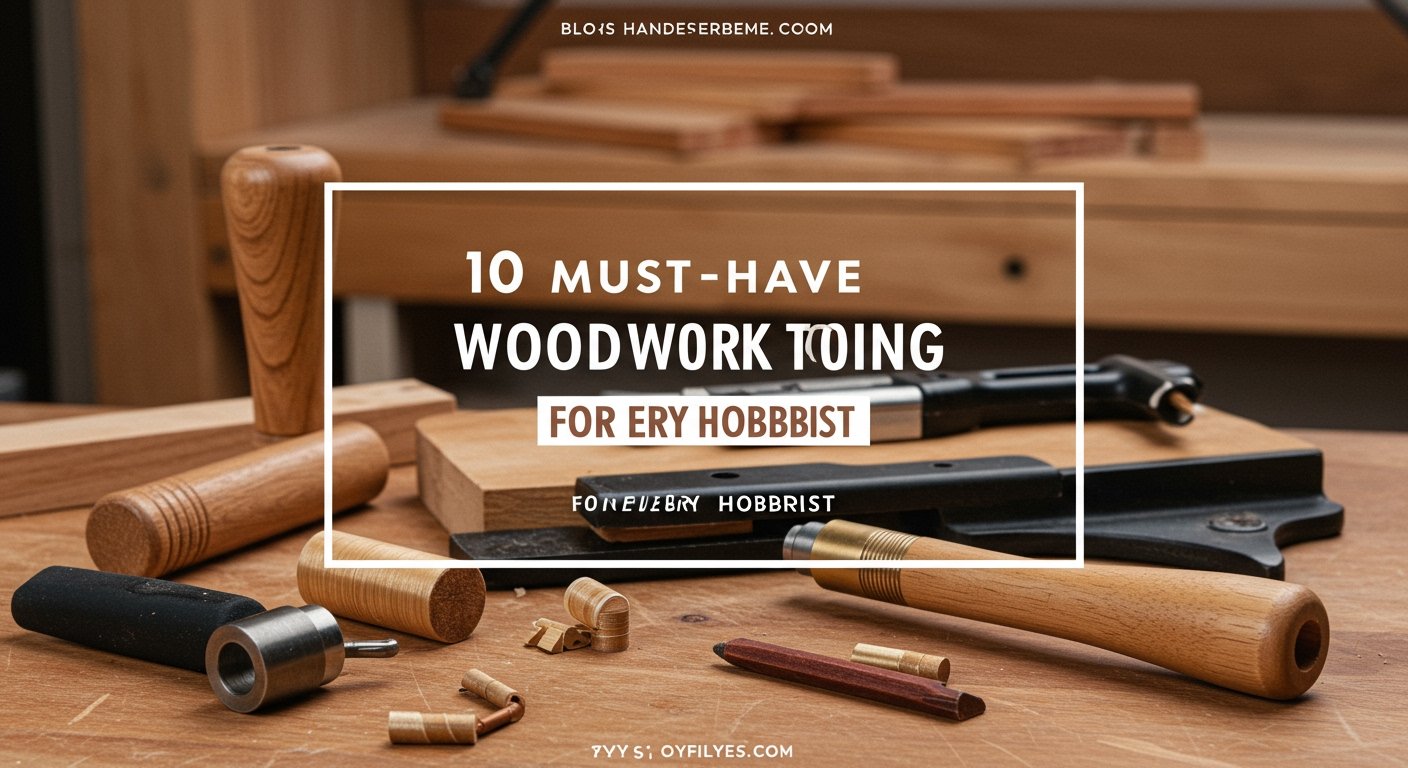There’s a unique satisfaction that comes from transforming a raw piece of wood into something beautiful and functional. Whether you dream of crafting custom furniture, building practical storage solutions, or simply enjoy the tactile process of working with your hands, woodworking offers a rewarding creative outlet. For aspiring woodworkers, the journey often begins with a fundamental question: what are the essential woodworking tools for beginners? This guide will walk you through the top 10 must-have tools, ensuring you have a solid foundation to embark on your first woodworking projects.

The allure of woodworking, particularly the Do-It-Yourself (DIY) segment, is experiencing significant growth. The global hand tools and woodworking tools market, valued at USD 9.57 billion in 2024, is projected to reach USD 14.21 billion by 2034, growing at a compound annual growth rate (CAGR) of 4.03%. Within this thriving market, the DIY segment is expected to show the fastest growth [4]. This trend is also evident in the broader DIY tools market, which was valued at USD 940.42 billion in 2024 and is projected to reach USD 1281.69 billion by 2033, with a strong CAGR of 3.5% [18]. Similarly, the Home Improvement and DIY segment of the woodworking tool market alone was estimated at USD 12.67 billion in 2023 and is projected to grow at a CAGR of 4.0% from 2023 to 2032 [17]. This increasing popularity underscores that now is an excellent time to get started with this fulfilling hobby!
What Tools Should a Beginner Woodworker Have? Your Essential Woodworking Tools for Beginners List
Starting a woodworking hobby doesn’t require a fully equipped professional shop. Instead, focus on acquiring starter woodworking tools that are versatile and fundamental to most projects. This beginner woodworking tools list prioritizes functionality, safety, and affordability, helping you build your collection strategically. These are the basic tools every woodworker needs to confidently tackle a variety of tasks.
1. Measuring Tape
Accurate measurement is the cornerstone of successful woodworking. A good quality tape measure, typically 16 or 25 feet long, is indispensable for laying out dimensions on your materials. Look for one with clear markings and a sturdy lock.
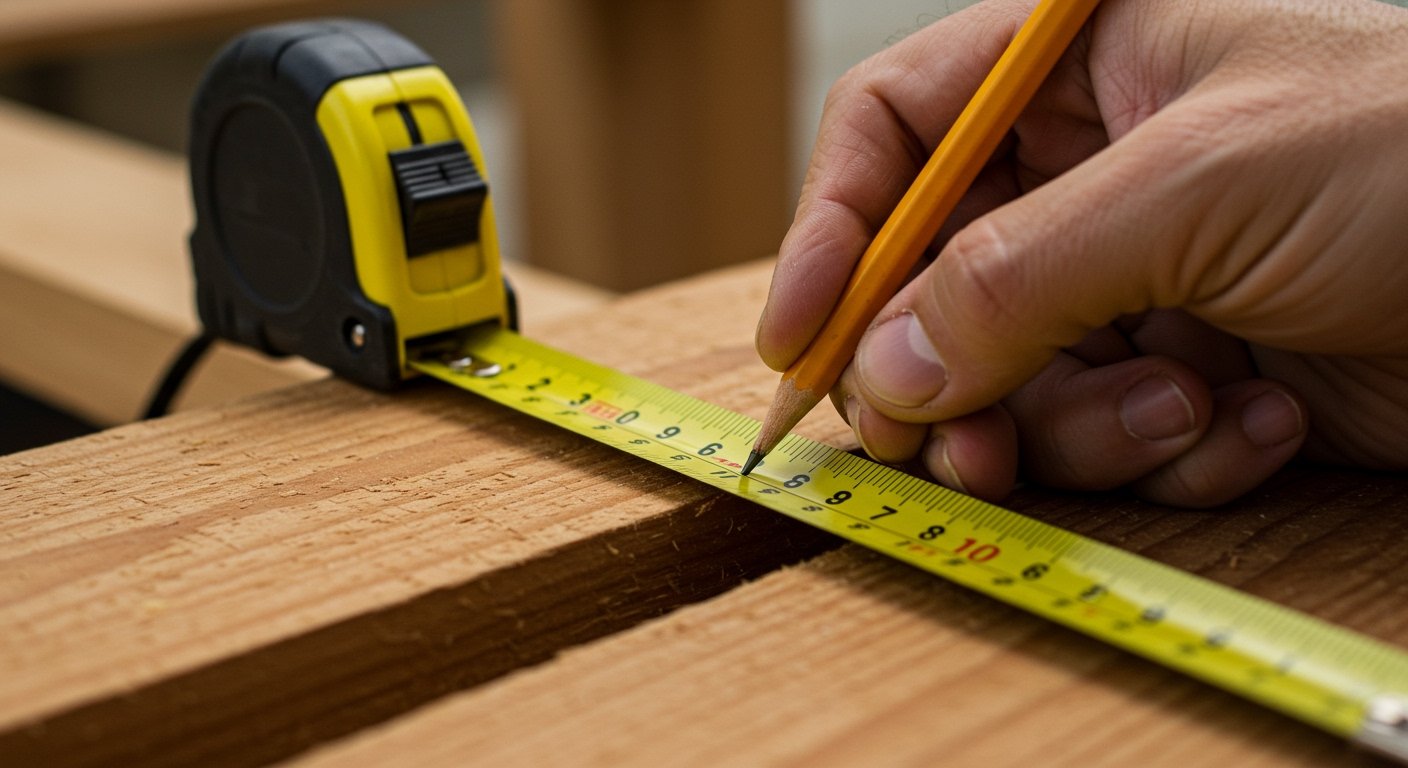
2. Combination Square
Beyond just measuring length, a combination square allows you to mark perfectly square lines (90 degrees) and 45-degree angles. This tool is crucial for ensuring your cuts and joints are precise, preventing frustrating mistakes down the line.
3. Pencil and Marking Knife
While a pencil is obvious for marking, a marking knife provides much finer, more accurate lines than a pencil, which is essential for precise cuts and joinery. Using a knife scores the wood fibers, helping to prevent tear-out when you make your cut.
4. Hand Saw
For those just starting out or working in woodworking tools for small spaces, a good hand saw is an essential hand tool woodworking must-have. While power saws offer speed, a sharp hand saw provides control and can be surprisingly efficient for cross-cutting boards or making intricate cuts. Consider a Japanese-style pull saw for cleaner, easier cuts for beginners. Hand saws can efficiently make precise, curved cuts that would be tricky with power saws. [20]
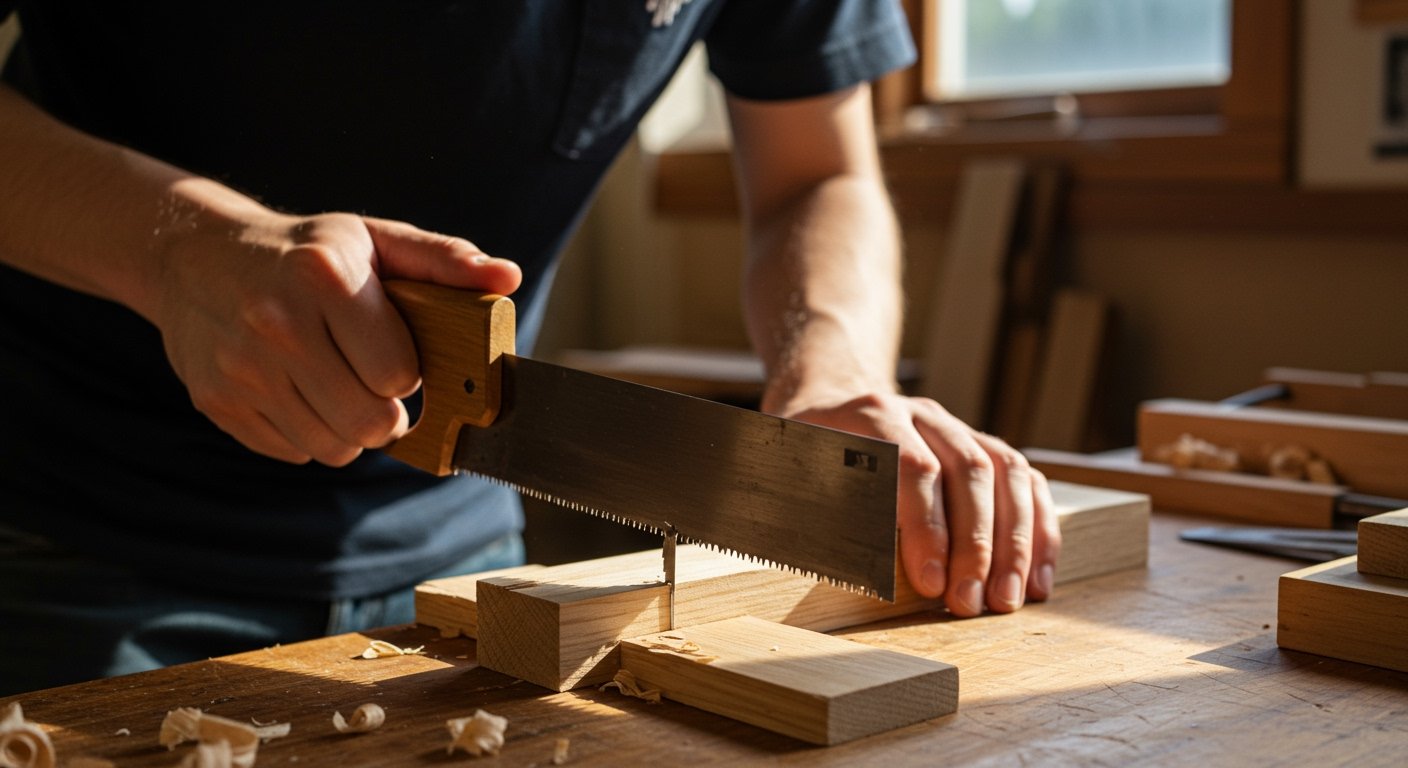
5. Jigsaw or Circular Saw
When it comes to power tools for beginner woodworkers, a jigsaw or a circular saw is a great starting point. A jigsaw is excellent for cutting curves and intricate shapes, making it ideal for woodworking tools for small projects. A circular saw, on the other hand, excels at making straight cuts quickly and efficiently, especially for breaking down larger sheets of plywood or longer boards. Many modern circular saws are cordless, offering great portability and convenience [17, 18].
6. Chisels
An assortment of sharp chisels is vital for fine-tuning joints, cleaning out mortises, and shaping wood by hand. Chisels cut and shape wood intricately in places that other tools can’t easily reach. [20] Start with a basic set of three to four common sizes (e.g., 1/4 inch, 1/2 inch, 3/4 inch, 1 inch) and learn how to sharpen them properly – a sharp chisel is a safe and effective chisel.
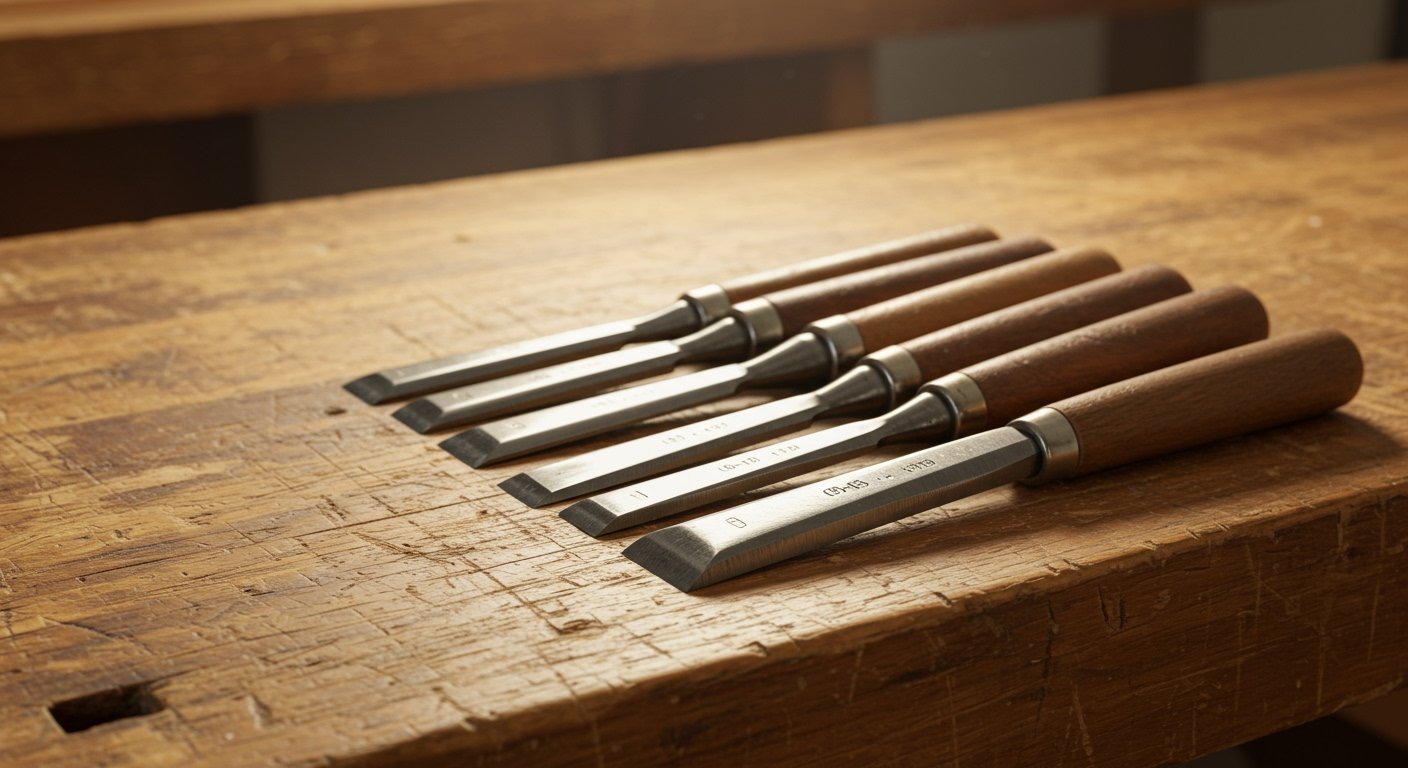
7. Random Orbit Sander
Achieving a smooth finish is crucial for any woodworking project. A random orbit sander makes this task much easier and faster than hand sanding. It’s a versatile entry level woodworking tool that uses circular pads that move in an eccentric pattern, minimizing swirl marks and producing a beautiful surface ready for finishing.
8. Drill/Driver
Whether you need to drill pilot holes for screws or drive fasteners, a cordless drill/driver is an indispensable tool. Its versatility extends beyond just woodworking, making it a valuable addition to any hobbyist’s toolkit. Cordless models offer incredible flexibility and are a key driver in the growing demand for woodworking tools [17].
9. Clamps (Must-Have Clamps Woodworking)
You can never have too many clamps in woodworking! Clamps are essential for holding workpieces securely while glue dries, for assembling projects, or for holding stock while you cut or drill. Start with a few F-style clamps and some spring clamps – these are must have clamps woodworking beginners will use constantly. Clamps are used to hold a workpiece while being worked. [6]
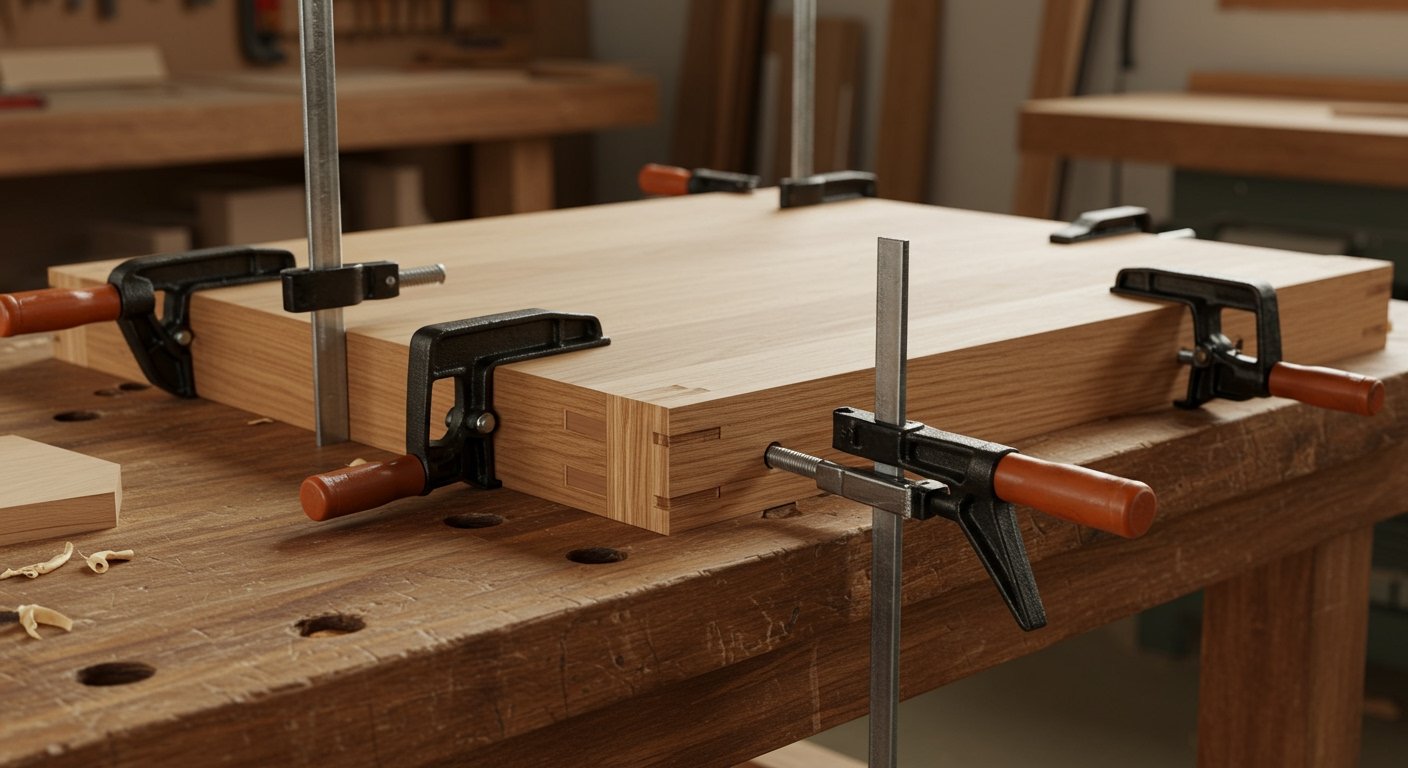
10. Claw Hammer
The humble claw hammer is a classic basic woodworking tool for hobbyists. It’s used for driving nails, but its claw can also be used for prying apart wood or pulling out errant fasteners. Every workshop needs a reliable claw hammer, making it one of the most important woodworking tools for general use. The claw hammer is the most common hammer used in woodworking. [6]
Woodworking Tools for Small Spaces and Small Projects
Many beginner woodworkers are constrained by limited workshop space. The good news is that you don’t need a sprawling workshop to enjoy woodworking. Focus on woodworking tools for small spaces that are compact and multi-functional. Hand tools, like those listed above, are naturally space-saving. For power tools, consider compact versions of circular saws or jigsaws, and prioritize cordless options for portability and easy storage. A sturdy, collapsible workbench can also be a game-changer for maximizing your available area.
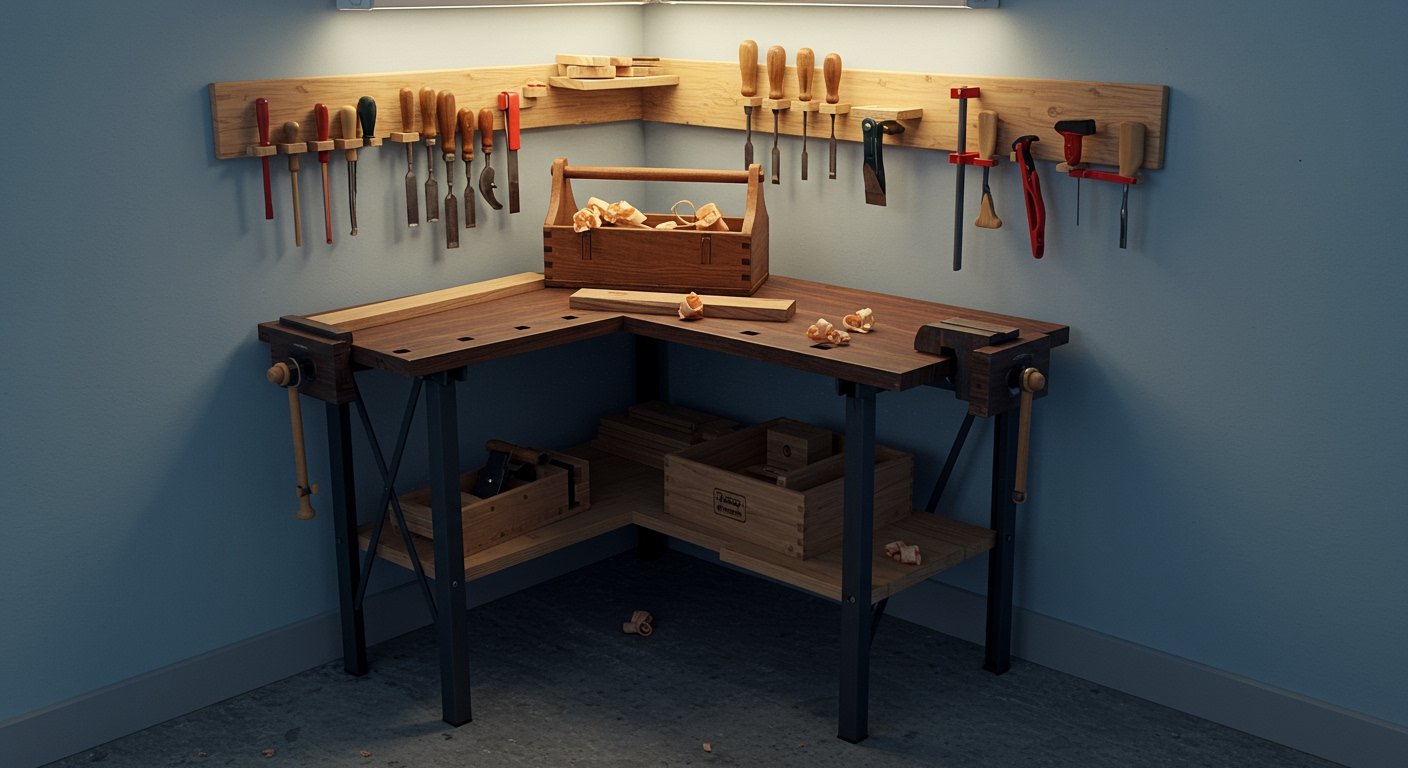
Setting Up Your Beginner Woodworking Shop Safely
Safety should always be your top priority. Before you even make your first cut, it’s crucial to establish a safe working environment and understand proper woodworking safety equipment and practices. The Occupational Safety and Health Administration (OSHA) provides comprehensive guidelines for woodworking safety, emphasizing the importance of personal protective equipment (PPE), a clean work area, and proper tool usage [1, 2, 3].
Here are some key safety tips:
- Always wear safety glasses or goggles: Protect your eyes from flying debris and dust [1, 2].
- Use hearing protection: Power tools can be loud; earmuffs or earplugs are essential [2].
- Wear a dust mask or respirator: Wood dust can cause respiratory issues, especially with prolonged exposure [2, 5].
- Keep your work area clean and organized: Clutter can lead to trips and falls [2].
- Unplug tools before making adjustments: Always disconnect power sources when changing blades or bits [2, 20].
- Secure your workpiece: Use clamps or a vise to hold wood firmly in place while cutting or drilling [2].
- Read tool manuals: Understand how to operate each tool safely before use.
Investing Smart: Affordable & Entry-Level Woodworking Tools
When building your collection of best first woodworking tools, it’s wise to start with affordable woodworking tools that offer good value and performance. You don’t need to buy the most expensive brands right away. Many reputable manufacturers offer quality entry level woodworking tools that are perfect for hobbyists.
Look for tools with solid construction, comfortable ergonomics, and positive reviews from other beginners. Prioritize versatility; a tool that can perform multiple functions will be more valuable in a growing shop. As your skills advance and you take on more complex beginner woodworking projects, you can gradually upgrade or expand your toolkit with specialized items based on your specific needs and interests. Don’t be afraid to ask for woodworking tool recommendations from experienced woodworkers in online communities or local clubs.
Conclusion
Embarking on a woodworking journey is an incredibly rewarding experience. By starting with these 10 essential woodworking tools for beginners, you’ll be well-equipped to tackle a variety of projects, develop fundamental skills, and cultivate a lifelong passion. Remember that patience, practice, and a commitment to safety are just as important as the tools themselves. So, gather your gear, clear your workspace, and get ready to create something amazing with your own hands!
